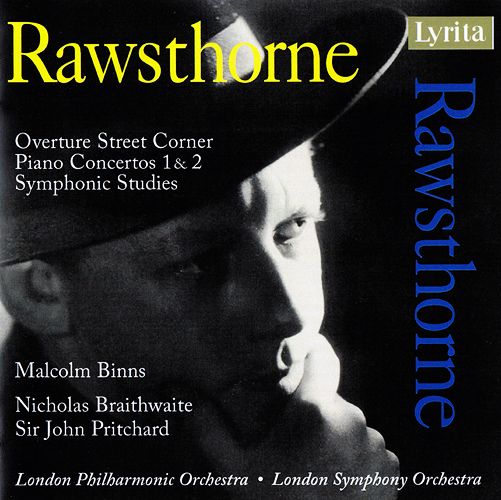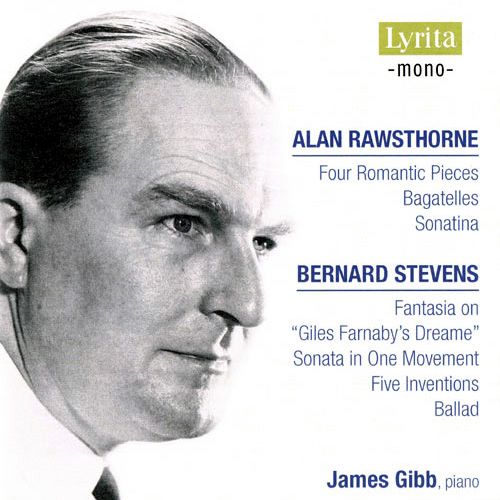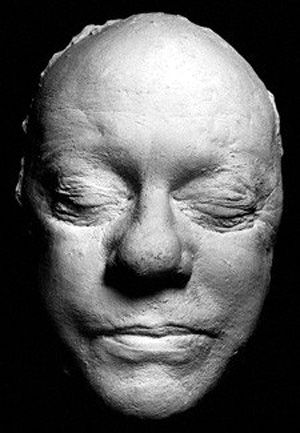wimpel69
04-13-2014, 11:34 AM
The sharing period for this selection has ended.
No more requests, and no re-ups, please!
Alan Rawsthorne (1905-1971) was born in Haslingden, Lancashire, and only considered music
as a profession after abortive starts at careers in dentistry and architecture. At 19, he enrolled in the
Royal Manchester College of Music, studying under Frank Merrick and Carl Fuchs, and he later studied
piano under Egon Petri in Berlin. He subsequently joined the faculty at Dartington Hall School and served
as a composer for its School of Dance Mime.
His first critical recognition came with the Theme and Variations for two violins, which was premiered
at the 1938 London Festival of the International Society of Contemporary Music. At the next festival,
held in Warsaw, Rawsthorne debuted his first major orchestral work, the Symphonic Studies, and
his First Piano Concerto (which he later rescored) was premiered later that same year. The composer
served in the British Army during World War II, a period in which he completed the Street Corner and
Corteges overtures. With the coming of peace, Rawsthorne, now in his forties, entered the prime of his
career and exclusively devoted his time to composing. Over the next 25 years, he wrote three symphonies;
two concertos for violin; a second piano concerto and a cello concerto; a brace of choral works, including
cantatas and songs; the song cycle Practical Cats (set to T.S. Eliot) for speaker and orchestra; and numerous
chamber works, as well as writing the music for four plays. He also wrote music for 27 movies, including such
distinguished postwar productions as The Captive Heart, Saraband for Dead Lovers, The Cruel Sea, West of
Zanzibar, and Lease of Life. The most obvious influences on Rawsthorne's early work were Hindemith
and Walton, with a similarly lean, neo-Classical feel that is modernistic without being dissonant; not surprisingly,
however -- given his relatively late entry into music -- his music's characteristics are all his own. From the early
1950s onward, he devoted even more energy to vocal music (even his Symphony No.2 included a part for
soprano in its last movement) and beginning in the early '60s, Rawsthorne's music embraced atonalism in a
more obvious way. His music was always respected, sufficiently so that he was able to survive (with help from
the film work) on a steady stream of commissioned pieces from 1946 onward.



Music Composed by
Alan Rawsthorne
Bernard Stevens
Played by the
London Symphony Orchestra
London Philharmonic Orchestra
BBC Symphony Orchestra
With
Malcolm Binns (piano)
Tracey Chadwell (soprano)
James Gibb (piano)
Conducted by
Sir John Pritchard
Nicholas Braithwaite
Norman Del Mar
"There are fine performances out there for every work on this disc devoted exclusively to English
modernist composer Alan Rawsthorne. There are the biting premiere recordings of the Symphonic
Studies and Overture "Street Corner" by Constant Lambert and the Philharmonic Orchestra from
1946, plus a sprightly "Street Corner" by John Barbirolli and the Hall� Orchestra from 1968. There
is the big-hearted premiere recording of the Piano Concerto No. 1 by Moura Lympany from 1956
and the exacting premiere recording of Piano Concerto No. 2 by Clifford Curzon from 1951, plus
an outstanding 1956 recording by Denis Matthews and a compelling 1983 John Ogdon. And then
there are the exciting 1992 recordings of both concertos by Geoffrey Tozer and the masterful
2001 recordings by Peter Donohoe.
But still, for anyone who already knows the music, another recording will be hard to pass up,
particularly one as attractive as this. Pianist Malcolm Binns has plenty of power, more than
enough passion, and just enough irony to make his performances of the concertos appealing
in their own right, and conductor Nicholas Braithwaite and the London Symphony Orchestra
support him from start to finish. John Pritchard and the London Philharmonic Orchestra's
Symphonic Studies and Overture might not have quite the snap of Lambert's performance,
but Pritchard is technically a better conductor, the LPO is clearly a better orchestra, and the
1977 Lyrita stereo sound is vastly cleaner and warmer than the 1946 premieres. In short,
this disc is well worth hearing by fans of English modernism in general and Rawsthorne
in particular."
All Music

Source: Lyrita CDs (my rips!)
Format: FLAC(RAR), ADD/DDD Stereo/Mono, Level: -5
File Sizes: 322 MB + 378 MB + 158 MB (incl. artwork & booklets)
The sharing period for this selection has ended.
No more requests, and no re-ups, please!
No more requests, and no re-ups, please!
Alan Rawsthorne (1905-1971) was born in Haslingden, Lancashire, and only considered music
as a profession after abortive starts at careers in dentistry and architecture. At 19, he enrolled in the
Royal Manchester College of Music, studying under Frank Merrick and Carl Fuchs, and he later studied
piano under Egon Petri in Berlin. He subsequently joined the faculty at Dartington Hall School and served
as a composer for its School of Dance Mime.
His first critical recognition came with the Theme and Variations for two violins, which was premiered
at the 1938 London Festival of the International Society of Contemporary Music. At the next festival,
held in Warsaw, Rawsthorne debuted his first major orchestral work, the Symphonic Studies, and
his First Piano Concerto (which he later rescored) was premiered later that same year. The composer
served in the British Army during World War II, a period in which he completed the Street Corner and
Corteges overtures. With the coming of peace, Rawsthorne, now in his forties, entered the prime of his
career and exclusively devoted his time to composing. Over the next 25 years, he wrote three symphonies;
two concertos for violin; a second piano concerto and a cello concerto; a brace of choral works, including
cantatas and songs; the song cycle Practical Cats (set to T.S. Eliot) for speaker and orchestra; and numerous
chamber works, as well as writing the music for four plays. He also wrote music for 27 movies, including such
distinguished postwar productions as The Captive Heart, Saraband for Dead Lovers, The Cruel Sea, West of
Zanzibar, and Lease of Life. The most obvious influences on Rawsthorne's early work were Hindemith
and Walton, with a similarly lean, neo-Classical feel that is modernistic without being dissonant; not surprisingly,
however -- given his relatively late entry into music -- his music's characteristics are all his own. From the early
1950s onward, he devoted even more energy to vocal music (even his Symphony No.2 included a part for
soprano in its last movement) and beginning in the early '60s, Rawsthorne's music embraced atonalism in a
more obvious way. His music was always respected, sufficiently so that he was able to survive (with help from
the film work) on a steady stream of commissioned pieces from 1946 onward.



Music Composed by
Alan Rawsthorne
Bernard Stevens
Played by the
London Symphony Orchestra
London Philharmonic Orchestra
BBC Symphony Orchestra
With
Malcolm Binns (piano)
Tracey Chadwell (soprano)
James Gibb (piano)
Conducted by
Sir John Pritchard
Nicholas Braithwaite
Norman Del Mar
"There are fine performances out there for every work on this disc devoted exclusively to English
modernist composer Alan Rawsthorne. There are the biting premiere recordings of the Symphonic
Studies and Overture "Street Corner" by Constant Lambert and the Philharmonic Orchestra from
1946, plus a sprightly "Street Corner" by John Barbirolli and the Hall� Orchestra from 1968. There
is the big-hearted premiere recording of the Piano Concerto No. 1 by Moura Lympany from 1956
and the exacting premiere recording of Piano Concerto No. 2 by Clifford Curzon from 1951, plus
an outstanding 1956 recording by Denis Matthews and a compelling 1983 John Ogdon. And then
there are the exciting 1992 recordings of both concertos by Geoffrey Tozer and the masterful
2001 recordings by Peter Donohoe.
But still, for anyone who already knows the music, another recording will be hard to pass up,
particularly one as attractive as this. Pianist Malcolm Binns has plenty of power, more than
enough passion, and just enough irony to make his performances of the concertos appealing
in their own right, and conductor Nicholas Braithwaite and the London Symphony Orchestra
support him from start to finish. John Pritchard and the London Philharmonic Orchestra's
Symphonic Studies and Overture might not have quite the snap of Lambert's performance,
but Pritchard is technically a better conductor, the LPO is clearly a better orchestra, and the
1977 Lyrita stereo sound is vastly cleaner and warmer than the 1946 premieres. In short,
this disc is well worth hearing by fans of English modernism in general and Rawsthorne
in particular."
All Music

Source: Lyrita CDs (my rips!)
Format: FLAC(RAR), ADD/DDD Stereo/Mono, Level: -5
File Sizes: 322 MB + 378 MB + 158 MB (incl. artwork & booklets)
The sharing period for this selection has ended.
No more requests, and no re-ups, please!